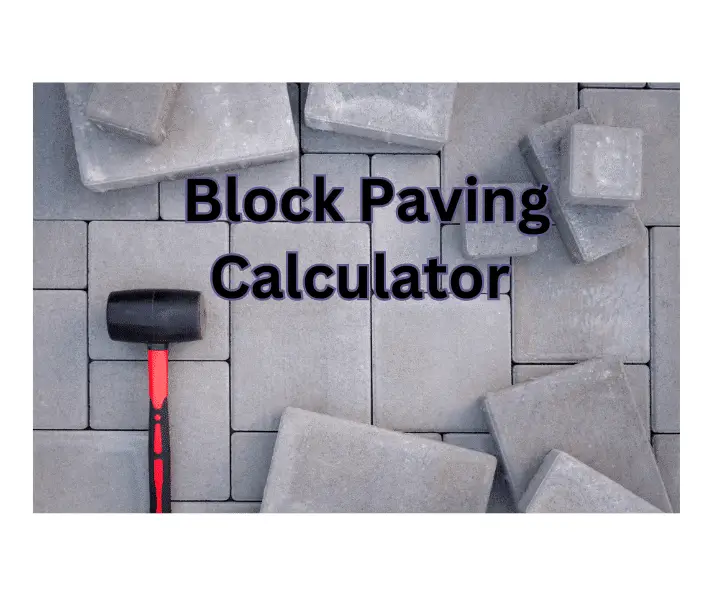This Block paving calculator quickly estimates the required amount of block pavers for your driveway or patio and outputs the area to be paved including the number of block pavers needed.
Calculate Block Paving Needed for You Driveway
Block Paving Calculator
How to use the block paving calculator:
- Enter the length and width of the area you want to pave in meters in the “Length of Patio” and “Width of Patio” fields, respectively.
- Enter the length and width of the blocks you plan to use in centimeters in the “Block Length” and “Block Width” fields, respectively.
- Click the “Calculate” button to see the total area of your patio and the number of blocks required to cover it.
- The “Area to be Paved” field will display the area of your patio in square meters, and the “Number of Blocks” field will display the number of blocks required to cover your patio.
- If you need to make any changes to your input values, you can update the appropriate field(s) and click the “Calculate” button again to see the updated results.
If you need help laying your paving we have The Ultimate Guide on How to Lay Block Paving
I hope this block paving calculator helps you if you need to work out the quantity of subbase to order use our Hardcore Calculator.
FAQ’s
How Many Block Pavers per m2?
Typically there is 50 blocks per m2 with the standard size for block pavers being 100mm x 200mm and 50mm deep, therefore the amounts of block pavers per square metre is 50.
Marshalls Driveline 50 are the most popular block paving in the UK
How Much is a Pack of Block Pavers?
On average, a pack of block pavers typically ranges from £200 to £800. However, it’s important to note that this is just an estimate, and prices can vary significantly. The cost of a pack of block pavers can vary depending on various factors such as the type of paver, size, quality, and your location.
What Type of Sand Should be Used for a Block Paved Driveway?
Sharp sand should be used when block paving a driveway, this makes a great base for the blocks.
How Deep Should the Sand be for a Block Paved Driveway?
Typically the sand for a block paved driveway should be 50mm deep this should be compacted using a vibrating plate.
Use our Sharp Sand Calculator to work out how much sand you need.
How Deep Should the Hardcore Sub-base be for a Block Paved Driveway?
Typically the hardcore sub-base for a block paved driveway should be 150mm deep, applied in two layers of 75mm with each layer being compacted with a vibrating plate.
Use our Sub Base Calculator to work out how much mot you need.
How Many Block Pavers Do I Need?
Typically you will need 50 block pavers per square metre of driveway. but this all depends on the size of the block.
Use the blockpaving calculator above to work out how many blocks are in a square metre.
How to Calculate How Much Sand is Needed for block paving?
The standard formula for working the amount of sand needed for block paving is Width x Length x 1.6, or you could use our grit sand calculator.
What is The Cost per 2m to Lay Block Paving?
When it comes to block paving, the typical cost for laying it is around £60 per square meter. This covers the labor charges and such. On top of that, you’ll need to factor in the cost of materials, which adds around £50 per square meter. So, on average, you’re looking at a total of approximately £110 per square meter
What are Block Paving Labour Costs per m2
The labour costs for block paving installation per square meter can vary depending on factors such as the complexity of the project, the location, and the specific contractor or company hired for the job. On average, the labor costs for block paving installation range from £500 to £110 per square meter.
What is The Cost of a New Block Paved Driveway?
The cost of a new block paved driveway can vary depending on various factors such as the size of the driveway, the type and quality of block pavers used, the complexity of the design, the site conditions, and the location. It’s recommended to use a driveway cost calculator to get a more accurate estimate for your specific project.
One reliable driveway cost calculator is available at driveway cost calculator. This online tool allows you to input details such as the dimensions of the driveway, the type of block pavers, the desired pattern, any additional features, and your location. The calculator then provides an estimate of the total cost based on the information provided.
Block paving driveway cost calculator UK
Using a block paving driveway cost calculator can be helpful in getting a rough idea of the cost involved in installing a new block paved driveway. However, it’s important to note that the estimate provided by the calculator is just an approximation, and the actual cost may vary depending on the specific requirements of your project and other factors.
It’s important to note that this estimate is a general range, and the actual cost may be higher or lower depending on the specific circumstances of your project. Factors that can influence the cost per square meters include the type and quality of the block pavers, the site preparation required, any additional features or patterns, and the level of expertise and experience of the contractor.
To get an accurate cost estimate for your specific project, it’s recommended to contact local contractors or paving companies and request quotes. They will be able to assess the details of your project and provide you with a more precise cost based on your requirements. Obtaining multiple quotes and comparing them will help you make an informed decision and find the best value for your investment.
If you are laying paving slabs then you could use our paving slab calculator to estimate the number of slabs required.
By using our block paving Calculator, you can quickly estimate the required amount of blocks needed for your paving project, making the planning process more efficient
Author Profile

- I have many qualifications and certificates in construction, such as City & Guilds, CPCS and CITB. These are the highest standards of training and competence in the industry. Whether you need help with plumbing, carpentry, bricklaying or any other trade, I’m here to help you succeed.
Latest entries
- March 6, 2024CalculatorsWall Tile Calculator: How Many Wall Tiles Do You Need
- February 29, 2024Roof Truss Cost Calculator
- December 31, 2023Wage Take Home Calculator
- December 30, 2023Day Rate Calculator


Comments are closed.